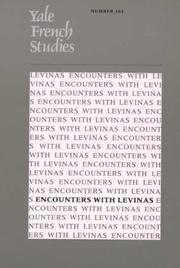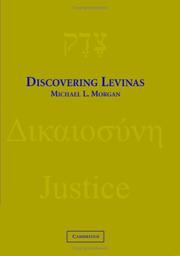| Listing 1 - 10 of 77 | << page >> |
Sort by
|
Book
ISBN: 9047443217 9789047443216 9004166262 9789004166264 Year: 2015 Publisher: Leiden Brill
Abstract | Keywords | Export | Availability | Bookmark
 Loading...
Loading...Choose an application
- Reference Manager
- EndNote
- RefWorks (Direct export to RefWorks)
The contributions of this volume discuss the legacy of Emmanuel Levinas’ philosophy. Examining critically the limits of his thinking, they also bear witness to its influence on contemporary philosophy, thus demonstrating the significance of his groundbreaking project of establishing ethics as first philosophy. In four parts, “First Philosophy, Phenomenology, and Ethics,” “Phenomenology and its Theological Turn?,” “Ethics and Aesthetics,” “Phenomenology, Hermeneutics, Deconstruction,“ the major themes in Levinas’ oeuvre are addressed, such as alterity, human dignity, religion, and communication. Contributors: Thomas Baumeister, Andris Breitling, Roger Burggraeve, Arthur Cools, Sylvie Courtine-Denamy, Eddo Evink, Matthias Flatscher, Gert-Jan van der Heiden, Alwin Letzkus, Burkhard Liebsch, Michel Lisse, Stefano Micali, Marcel Poorthuis, Renée van Riessen, Johan Taels, László Tengelyi, Rudi Visker, Jacques de Visscher, Elisabeth Weber.

ISBN: 9004453881 9050632173 Year: 1997 Publisher: Amsterdam : BRILL,
Abstract | Keywords | Export | Availability | Bookmark
 Loading...
Loading...Choose an application
- Reference Manager
- EndNote
- RefWorks (Direct export to RefWorks)
This volume, written by one of the leading scholars on Emmanuel Levinas, deals with Levinas' conception of Transcendence, Prophecy and Philosophy. Among the issues discussed in this volume are ontology and eschatology, Judaism and Hellenism, the relationship between transcendental and dialogical thought, the God of the Philosophers and the God of the Patriarchs. Theodore de Boer is Emeritus Professor of systematic philosophy at the Vrije Universiteit, Amsterdam.
Book
ISBN: 3832590846 3832547061 Year: 2018 Publisher: Berlin : Logos Verlag,
Abstract | Keywords | Export | Availability | Bookmark
 Loading...
Loading...Choose an application
- Reference Manager
- EndNote
- RefWorks (Direct export to RefWorks)
Long description: Was bedeutet es, naher Angehöriger eines Menschen im Wachkoma zu sein? An- und Zugehörige werden mit weitaus mehr Aufgaben und Herausforderungen als denen der Pflegebedürftigkeit des zumeist schwerst körperlich und geistig Erkrankten konfrontiert. Die vorliegende fachübergreifende Arbeit mit dem Titel Wer ist der Andere? schildert umfassend die Erfahrungen und das Erleben pflegender, begleitender und betreuender Angehöriger an der Seite eines Menschen mit erworbener Hirnschädigung und reflektiert diese mithilfe des die Grenzen des Verstehens aufzeigenden Denkens Emmanuel Levinas'. Aus dem Blickwinkel dieser zutiefst humanen Philosophie erhalten aktuelle Diskussionen über ein Leben mit Krankheit und ein Sterben in Würde sowohl in Hinblick auf medizinethische Fragestellungen als auch in Bezug auf den gesellschaftlichen und institutionellen Umgang mit den betroffenen Familien neue Impulse. Diese fußen -- auch vor dem Hintergrund der modernen Leistungsgesellschaft und dem Kostendruck des Gesundheitswesens -- auf einem verantwortungsvollen Umgang mit Anderssein und Veränderung individuellen Lebens und erteilen jeglicher Beliebigkeit zwischenmenschlicher Beziehung eine klare Absage.
Gerechtigkeit --- Pflege --- Verantwortung --- Medizinethik --- Wachkoma --- Lévinas, Emmanuel --- Ethics
Book
ISBN: 2253041165 9782253041160 Year: 1987 Volume: 4059 Publisher: Paris: Librairie générale française,
Abstract | Keywords | Export | Availability | Bookmark
 Loading...
Loading...Choose an application
- Reference Manager
- EndNote
- RefWorks (Direct export to RefWorks)
Lévinas, Emmanuel --- Lévinas, Emmanuel --- Philosophers, Modern. --- Levinas, Emmanuel, --- Philosophy --- anno 1900-1999 --- Kierkegaard, Søren, --- Proust, Marcel, --- Lévinas, Emmanuel.

ISBN: 030010216X 9780300102161 Year: 2003 Volume: 104 Publisher: New Haven, Conn.: Yale university press,
Abstract | Keywords | Export | Availability | Bookmark
 Loading...
Loading...Choose an application
- Reference Manager
- EndNote
- RefWorks (Direct export to RefWorks)
Lévinas, Emmanuel, --- Philosophy, French --- Philosophie française --- Lévinas, Emmanuel --- Lévinas, Emmanuel. --- Lévinas, Emmanuel, - 1906-1995

ISBN: 1107122759 1280430427 0511173725 0511041446 0511152906 051132507X 0511488238 0511047622 9780511041440 9780511488238 9780521801584 0521801583 9780511047626 9781107122758 9781280430428 9780511173721 9780511152900 9780521047166 0521047161 Year: 2001 Publisher: Cambridge, UK ; New York : Cambridge University Press,
Abstract | Keywords | Export | Availability | Bookmark
 Loading...
Loading...Choose an application
- Reference Manager
- EndNote
- RefWorks (Direct export to RefWorks)
The reputation and influence of Emmanuel Levinas (1906-96) has grown powerfully. Well known in France in his lifetime, he has since his death become widely regarded as a major European moral philosopher profoundly shaped by his Jewish background. A pupil of Husserl and Heidegger, Levinas pioneered new forms of exegesis with his post-modern readings of the Talmud, and as an ethicist brought together religious and non-religious, Jewish and non-Jewish traditions of contemporary thought. Richard A. Cohen has written a book which uses Levinas' work as its base but goes on to explore broader questions of interpretation in the context of text-based ethical thinking. Levinas' reorientation of philosophy is considered in critical contrast to alternative contemporary approaches such as those found in modern science, psychology, Nietzsche, Freud, Husserl, Heidegger, Sartre, Merleau-Ponty, Derrida and Ricoeur. Cohen explores a manner of philosophizing which he terms 'ethical exegesis'.
Lévinas, Emmanuel. --- Lévinas, Emmanuel --- Lévinas, Emmanuel --- Ethics. --- Lévinas, Emmanuel. --- Arts and Humanities --- Religion --- Levinas, Emmanuel. --- Levinas, Emmanuel
Book
ISBN: 0748652612 1283221829 9786613221827 0748647066 9780748647064 9780748641031 0748641033 9780748652617 9781283221825 6613221821 Year: 2011 Publisher: Edinburgh : Edinburgh University Press,
Abstract | Keywords | Export | Availability | Bookmark
 Loading...
Loading...Choose an application
- Reference Manager
- EndNote
- RefWorks (Direct export to RefWorks)
This monograph initiates the conversation between Levinas and postcolonial theory through a zig-zag reading asking both how postcolonial theory challenges so many Levinasian concepts and how a Levinasian ethics is crucial for the normative dimension of postcolonial thinking.
Postcolonialism. --- Post-colonialism --- Postcolonial theory --- Political science --- Decolonization --- Lévinas, Emmanuel. --- Lévinas, Emmanuel --- Lévinas, Emmanuel --- Political and social views. --- Ethics. --- Levinas, Emmanuel.
Book
ISBN: 1644698552 1644698544 1644698536 9781644698556 9781644698549 9781644698532 Year: 2022 Publisher: Brookline, MA
Abstract | Keywords | Export | Availability | Bookmark
 Loading...
Loading...Choose an application
- Reference Manager
- EndNote
- RefWorks (Direct export to RefWorks)
Yeshayahu Leibowitz and Emmanuel Levinas were amongst the two leading Jewish thinkers to have emerged in the second half of the twentieth century. This book puts in dialogue these two titanic figures, particularly within the frameworks of Zionism, political theology, and European totalitarianism.
Jewish philosophy --- Leibowitz, Yeshayahu, --- Lévinas, Emmanuel. --- Lévinas, Emmanuel --- Holocaust. --- JEwish thinkers. --- Jewish Studies. --- Religious Studies. --- Zionism. --- intellectual history. --- philosophy.
Book
ISBN: 1281990515 9786611990510 3110210495 311020570X Year: 2008 Publisher: Berlin ; Boston : De Gruyter,
Abstract | Keywords | Export | Availability | Bookmark
 Loading...
Loading...Choose an application
- Reference Manager
- EndNote
- RefWorks (Direct export to RefWorks)
This book contrasts Nietzsche's and Levinas' deconstructions of Greco-European thought and their critiques of morality. Through examining their approaches to deconstruction, the author reveals the motivations of their critiques and shows their unique position in philosophical discourse. Nietzsche's and Levinas' alternatives to the prevailing moral values of their time are then compared and contrasted. Both alternatives point towards every individual's unbounded responsibility, illustrated by examples from Dostoevsky texts.
Ethics. --- Nietzsche, Friedrich Wilhelm, --- Dostoyevsky, Fyodor, --- Lévinas, Emmanuel. --- Dostoevskij, Fedor M. --- Nietzsche, Friedrich --- Lévinas, Emmanuel --- Criticism and interpretation. --- Verantwortung --- Levinas, Emmanuel. --- Moral Philosophy. --- Nietzsche, Friedrich.

ISBN: 9780521872591 9780521759687 9780511805240 9780511290473 0511290470 0511805241 0521759684 0521872596 1107180775 1280917288 9786610917280 0511289871 051128859X 0511301839 0511289278 Year: 2009 Publisher: Cambridge Cambridge University Press
Abstract | Keywords | Export | Availability | Bookmark
 Loading...
Loading...Choose an application
- Reference Manager
- EndNote
- RefWorks (Direct export to RefWorks)
In Discovering Levinas, Michael L. Morgan shows how this thinker faces in novel and provocative ways central philosophical problems of twentieth-century philosophy and religious thought. He tackles this task by placing Levinas in conversation with philosophers such as Donald Davidson, Stanley Cavell, John McDowell, Onora O'Neill, Charles Taylor, and Cora Diamond. He also seeks to understand Levinas within philosophical, religious, and political developments in the history of twentieth-century intellectual culture. Morgan demystifies Levinas by examining his unfamiliar and surprising vocabulary, interpreting texts with an eye to clarity, and arguing that Levinas can be understood as a philosopher of the everyday. Morgan also shows that Levinas's ethics is not morally and politically irrelevant nor is it excessively narrow and demanding in unacceptable ways. Neither glib dismissal nor fawning acceptance, this book provides a sympathetic reading that can form a foundation for a responsible critique.
Lévinas, Emmanuel. --- Lévinas, Emmanuel --- Levinas, Emmanuel --- Lévinas, Emmanuel. --- Arts and Humanities --- Religion --- Levinas, Emmanuel.
| Listing 1 - 10 of 77 | << page >> |
Sort by
|

 Search
Search Feedback
Feedback About UniCat
About UniCat  Help
Help News
News